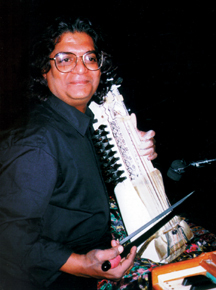Ramesh Misra
Sarangi
Pandit Ramesh Misra, mastering over one of the most difficult unique string instruments 'Sarangi', acquired training from finest musicians of Benaras Gharana, Pandit Hanuman Prasad Mishra and late Pandit Gopal Mishra and the legendary maestro Pandit Ravi Shankar. A recipient of India's most prestigious Sangeet Natak Award. His Sarangi can be heard in many music productions, including his solo albums and Ravi Shankar's 'Inside the Kremlin' and the Grammy nominated album 'Legacy' produced by the legendary Ali Akbar Khan. He also appears on 'Journey on the Strings' with Ustad Habib Khan and Swapan Chaudhuri. Pandit Misra is also one of the recording artists in Aerosmith's album.
Ramesh is on one X DOT 25 Music album. Arctic Soul by Alan Kushan.
Album Details:
Arctic Soul
Style/Genre: New Age /World /Ambient
Instrumentation: Santur, Voices, Keyboards, Tabla, Sarangi.
Pandit Ramesh Misra - Sarangi
Ustad Pranesh Khan - Tabla
Those parts of thee that the world's eye doth view
Want nothing that the thought of hearts can mend;
All tongues, the voice of souls, give thee that due,
Utt'ring bare ruth, even so as foes commend.
--------- Shakespeare
The original compositions in this album reflect influences from Africa, Persia, India, Romania, and the Blues. The goal was to interconnect musical colors relating to a tranquil mind environment & Santur as an instrument. In this album Alan Kushan on Santur and Voices is accompanied by Pandit Ramesh Misra on Sarangi, Ustad Pranesh Khan on Tabla, Robert Simms on Keyboard & Percussion.
Tracks:
1 Indigo Void (5:27)
2 The Blues Voyager (5:52)
3 Avatar - the Dusty Poet (8:59)
4 Starless Planet Dance Goddess (9:18)
5 Khesed (8:02)
6 One of One (8:02)
7 Mehr O Mah (4:22)
Total time: 50:05
Item # CD 1014-2
Produced by Alan Kushan
Alan Kushan: Santur & Voices (All Tracks)
Pandit Ramesh Misra: Sarangi (Track 3)
Ustad Pranesh Khan: Tabla (Track 2, 3, 4, 6)
Robert Simms: Keyboard & Percussion (All Tracks)
Sound Design and Engineered By Steven Sena at SX Sound Studio.
Mastered by Albert Benichou at CD Premastering in Emeryville, California.
Mehr o Mah is Persian; Mehr means 'love & sun", Mah means "the moon".
Khesed in Hebrew means "loving & kindness". John Villa - Didgeridoo/percussion (Track 1)
Debo Priyo Sarkar - Tabla (Track 4) Cover Design: Farzaneh Foroughi
Alan Kushan, born in the mountains of Kurdestan, is arguably one of the most accomplished santur players in the world. He stands out not only because of his brilliant realizations of traditional Persian compositions, but also for his innovative Avant-guard soundscapes. He is not only a builder of Persian instruments but also a virtuoso in performing Persian traditional music. His style, however, is not limited to traditional approaches but it extends itself beyond any such boundaries. He applies his own touch to the music that he performs, a touch which he has developed after experiencing the new trend of music, not only in his native land of Iran, but in the world.
Pandit Ramesh Misra, mastering over one of the most difficult unique string instruments 'Sarangi', acquired training from finest musicians of Benaras Gharana, Pandit Hanuman Prasad Mishra and late Pandit Gopal Mishra and the legendary maestro Pandit Ravi Shankar. A recipient of India's most prestigious Sangeet Natak Award. His Sarangi can be heard in many music productions, including his solo albums and Ravi Shankar's 'Inside the Kremlin' and the Grammy nominated album 'Legacy' produced by the legendary Ali Akbar Khan. He also appears on 'Journey on the Strings' with Ustad Habib Khan and Swapan Chaudhuri. Pandit Misra is also one of the recording artists in Aerosmith's recent album.
Ustad Pranesh Khan, began his music studies with his grandfather Baba Allauddin Khan and father Ali Akbar Khan. He has studied with tabla legends Kanai Data, Shankar Ghosh, Alla Rakha, Zakir Hussain and Swapan Chaudhuri. Pranesh Khan is a master tabla player whose musical career includes performances with many noted European, American, and Indian musicians, including the Philadelphia String Quartet, Paul Horn, John Handy, Alice Coltrane and the Shanti and Third Eye fusion bands, Ali Akbar Khan, Aashish Khan, Nikhil Banerjee, Laksmi Shankar and G.S. Sachdev.
The ancient musical instrument SANTUR, has a unique trapezoid shape, and is more commonly known in the western world as the "hammered dulcimer". The origins of the SANTUR lie in ancient Persia and the instrument has inherited a proud legacy that is thousands of years old. Because of Persia's contacts with Greece, Rome, India, China, SANTUR found its way to such diverse areas of the world such as Ireland, Switzerland, Poland, the Ukraine, Hungary, Korea, and Germany. Each of these nations has adapted the SANTUR to its own musical temperament and has christened it with its own unique name. One of Alan Kushan's many contributions to the SANTUR has been to broaden its musical range by increasing the number of bridges (notes) available to the musician. This expands the SANTUR from a typically restricted pitch area into an instrument capable of travelling previously unexplored musical territories. Alan designs and constructs these unique SANTURS and, in addition to differing gauges of steel and copper wire, he uses piano and harp strings to create fascinating variations in tonal quality.The original compositions in this album reflect influences from Africa, Persia, India, Rumania, and Blues. The goal was to interconnect musical colors relating to a tranquil mind environment that Alan Kushan has absorbed since childhood.







